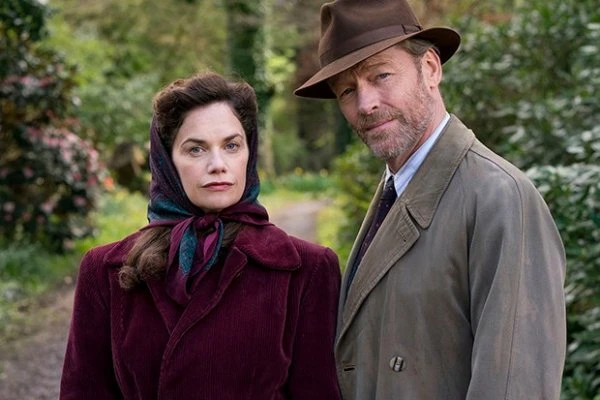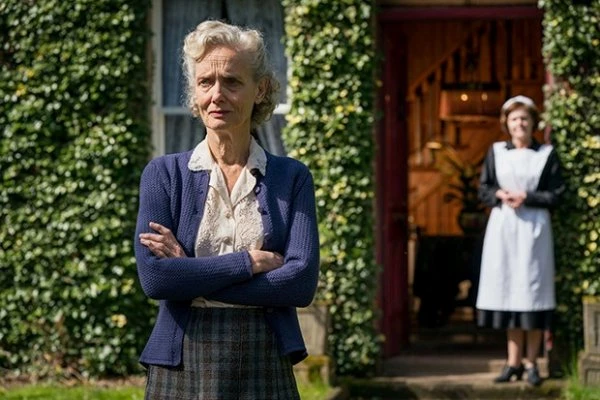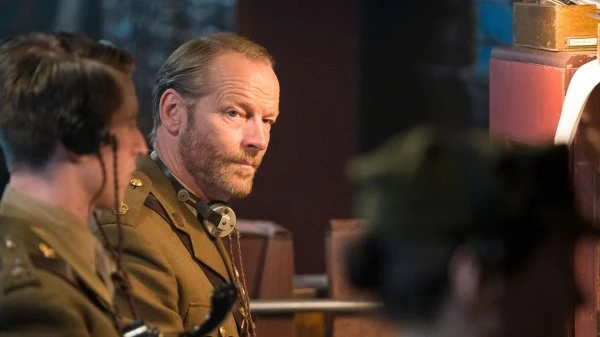
Mrs Wilson
2018 - United KingdomReview - JWR
While it is probably fair to say that BBC drama no longer has the global preeminence in terms of quality that it enjoyed in its Golden Age, it still has its moments and the last few years have seen a general improvement after a couple of relatively forgettable decades. In particular, the Beeb had a solid run of interesting "miniseries" in 2018, including McMafia, The Little Drummer Girl, and Mrs Wilson.
Of these, Mrs Wilson was easily the best because of its leading performance, and its narrative daring in getting away with a plot so full of plot twists and reversals that it would have seemed ludicrous in a less accomplished production.
It begins on a credible domestic note with a man dying of an unexpected heart attack. The shock and confusion of immediate aftermath, when no one is sure of what to do or even how they feel, are conveyed realistically, especially by Ruth Wilson as the new widow, Alison, the eponymous Mrs Wilson.

The normal disruption of life that is inevitable with a sudden death is disrupted in turn by an intrusion that is anything but normal. A woman arrives at the door claiming to be the widow of the dead man - the real Mrs Wilson.
Our Mrs Wilson, that is to say Ruth Wilson's Mrs Wilson - this gets very confusing very quickly - is stunned by this and at first reluctant to accept it. However, it turns out that she met her husband, Alec, played by Iain Glen, during the Second World War. He was an older man and she knew he had been married before. It is possible that there had been a mix up with the divorce papers or something like that. Such things happened a lot in those days.

Perhaps our Mrs Wilson, Alison, would have done well to have accepted that, but she feels compelled to keep digging. It is not long before a third Mrs Wilson turns up - and that is by no means the end of it.
Alec, a fairly successful thriller writer, at least in his younger days, was apparently an epic fantasist in his own life, possibly even to the extent of pretending to have been killed in action at El Alamein. He seems to have deluded himself into thinking he was a character in one of his own books.

Or did he? What separates Alec Wilson from the usual con-men and serial bigamists who were by no means unusual in the pre-Internet age was that he served with MI6 during the War. He explained many things that seemed odd to his wives by claiming that he was working undercover. This is, of course, a Big Lie often employed by con-men and bigamists, and, judging by the tabloids, it is still used to this very day. Its advantage is that there is generally no way of verifying or falsifying it, even with online access, because the truth remains a carefully guarded state secret.
In Alec's case, however, our Mrs Wilson knew that he really did work for MI6, because they had met when she was working there herself. The compartmentalisation necessary in such an organisation meant she could not know everything about his work, so it was not impossible that what he claimed was true. It is a classic example of how a little knowledge can be a dangerous thing.

It is enough to encourage our Mrs W to carry on with her investigations. A retired MI6 colleague (Fiona Shaw) warns her against asking awkward questions and, when our heroine persists, it is revealed that Alec had been dismissed from MI6 for reasons greatly to his discredit - knowledge which their old colleague says she wanted to spare Alison.
Further twists and revelations follow, most of them painting an increasingly seedy picture of poor Alec as a loser forced to seek menial employment, and, possibly as a defence, a compulsive liar. One begins to feel quite sorry for him. Against all this, there are tantalising glimpses of a completely different possibility. Another former colleague maintains that Alec was a great patriot, who did important work which saved many lives. Dark forces at work within the intelligence services might have forced him to go even deeper undercover, even to the extent of setting up his own disgrace.
All this sounds utterly unbelievable - but for two final twists...
The first is that this happens to be a true story. Although some dramatic liberties have been taken in the process of adaptation, as usually happens, the basic plot is based on the unpublished memoirs of the actual Mrs Wilson. Her experiences led Alison to a doubt in the reliability of perceived fact that she resolved only with a leap of faith by becoming a nun.

The second is that the reason that our Mrs Wilson is Ruth Wilson's Mrs Wilson is because Ruth Wilson the actress is also Ruth Wilson the granddaughter of Alec and Alison Wilson. Telling her family story was obviously a labour of love for her, and she served as executive producer as well as starring in the title role.
There are certainly no complaints about Ruth Wilson the producer casting Ruth Wilson the actress in the lead as Mrs Wilson the grandmother. She is perfect, as one would expect. She is in general one of the most consistently fascinating actresses on her way up at the moment. In Luther she took a character who was, by any objective standard, extremely unsympathetic, and projected such commanding intelligence that viewers wanted to see again and again. In Mrs Wilson she faced a very different challenge, dismantling the entire life of an extremely sympathetic character without making her look like a total idiot.

She succeeds because Alison remains an intelligent woman determined to take the initiative by seeking out the truth for herself. Whatever else, Alison is no dupe - which makes the fact that she was duped so comprehensively all the more astonishing.
Or was she duped so comprehensively? The question remains. That she was the victim of a bigamist is fact, but, beyond that, facts become more uncertain. The series ends with the usual "true story" hint about sealed records. To be honest, this is probably due more to official embarrassment at having employed Alec Wilson in a position of responsibility in the first place than any great state secret.

Yet it seems beyond all doubt that he really was the fanatical patriot, devout Roman Catholic, and loving husband and father he appeared to be - or at least, like many fantasists, he pretended to be what he wanted to be and, to an extent, became it. Wounded in the Great War, a passionate desire to serve his country was a constant throughout his life. If he padded his curriculum vitae, that was no more unusual then than it is now, and it does not alter the fact that he was a man of many genuine accomplishments.
It also must be noted that in the swashbuckling formative years of MI6, slightly eccentric charmers of the sort found in the novels of John Buchan, Ian Fleming, and, well, Alec Wilson, were not uncommon. Being a con-man and a bigamist was by no means a disqualification in the early days, as is proved by the case of the real life Sidney Reilly. It may be that poor Alec was simply the relic of a distant past when the sudden dramatic expansion of MI6 during the Second World War brought in a more bureaucratic ethos.
Finally, it must never be forgotten that that massive expansion brought a more truly undesirable type into MI6. The place was positively riddled with Communist agents. One of the agents whose investigations led to Alec's dismissal from MI6 was later revealed as an associate of Anthony Blunt. Talk of dark powers is therefore by no means paranoid fantasy.

Perhaps only Alec's twinkly eyed priest knows the full story - seeing that he is played by Ian McElhinney, who shared many scenes with Iain Glen when they were knights together in Game of Thrones - that he was spying for Lord Varys and that the true love of his life was a Khaleesi in Essos.
Frankly, given the impenetrable tangle of fact, fiction, and fantasy which makes up the biography of the real Alec Wilson, that is as good a conclusion as any. Like Alison, we are left pondering the most enigmatic line in the Gospels: "What is Truth?"
Seen this show? How do you rate it?
Seen this show? How do you rate it?
Published on January 2nd, 2020. Written by John Winterson Richards for Television Heaven.










